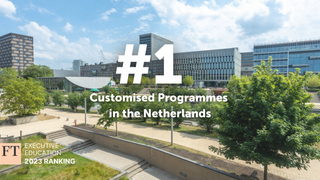The CEMS research from a global survey of recent CEMS graduates found a majority in favour, and some employers have commented that organisations will need to address their hybrid workplace strategies to accommodate the way these young people want to work. The view of 61 per cent of young professionals is that working between the office and home provides more flexibility, freedom to travel while working, improved well-being, reduced costs and the feeling of being valued by employers. A quarter, 25 per cent, of respondents said they did not think the move to hybrid working would make any difference to their career prospects at all, while only 14 per cent thought the impact would be negative.
The benefits of hybrid work
Following initial survey results, CEMS explored the findings in more depth through qualitative interviews with young professionals around the world who are just entering the workforce.
The majority of interviewees felt that hybrid working was the ideal set-up. They spoke of the benefits including:
- Opportunities to travel while working. Hybrid offers more flexibility, allowing more time for them to travel and even work whilst travelling (workcations), instead of taking longer vacations.
- Feeling valued. When working in a hybrid way young professionals feel that they are trusted and valued by their employer, as they are provided with freedom to set their own work schedule.
- Broader access to jobs. Hybrid working adds a whole new layer of flexibility for them to take on jobs that weren't accessible in the past.
- Reduced costs. The majority of graduates interviewed mentioned that they could save money and time by living in areas just outside big cities and commuting less frequently.
- Better work/life balance and well-being. Hybrid working allows more time to pursue hobbies, study and exercise. It provides more time to spend with family and friends – with an overall positive impact on well-being.
- Greater focus. Working between the office and home allows for focus and quiet time to get things done when needed, rather than constantly being in a busy office setting.
Hybrid rather than remote
Interviewees emphasised that they were positive about hybrid working, but not positive about working completely remotely. They believe that spending face-to-face time with colleagues inside and outside of office hours is vital for career success – in particular for networking opportunities, innovation and learning. They stressed the importance of teams regularly meeting in person and having working structures in place.
Commenting on the results, RSM student Leonard Bussee (MSc International Management/ CEMS 2023), said: “I think the reason that there is such strong support for hybrid working amongst the young and that it’s seen as such an advance is because we've finally learned how to best integrate work into our daily lives and how to build everything else around it.
“I feel there has been a rapid shift, a super quick shift in how working takes place. Many companies are reducing their office sizes and I feel that hybrid working is something that was wanted, especially by the younger generation, but was ‘supressed’ before Covid.
“Younger people are used to networking using tech. Hybrid working expands the radius within which you can network by an infinite amount, you can go anywhere in the world and connect with anyone. But I would say there is a trade-off. The personal aspect, the touch point which we all missed during Covid, definitely prevents you from making deeper connections.”
Leonard’s point about the personal aspect is borne out by research into the use of technology in hybrid-working. Steffen Giessner, Professor of Organisational Behaviour and Change at RSM, states that one key problem of hybrid working is that we are no longer able to effectively read body language in meetings. As a result, a lot of vital information is missed in online meetings, he said in this article in HRZone.
Prof. Giessner added: “Hybrid work models are appealing to employees as these increase workplace and worktime flexibility, self-management, technology-supported access to knowledge, and flexibility to balance work and family contexts. For employers, it has also advantages. They can reach a larger pool of talent and offer more diversified work opportunities. At the same time, there might be some challenges like team coordination, communication, knowledge sharing, work meaningfulness and experiences of work loneliness. So I suggest making use of the advantages and managing the challenges.
“For more senior employees, it is a change to their workplace. For the younger generation who have just started their careers, it is the ‘new normal’. Mostly, it should not be a comparison of old versus young employees but of those for whom it is a change and those for whom it is not. And if we do this, we do not start to blame or stigmatise older employees, but we see that we need to make a good change management for those who need it.
Prof. Giessner outlined the long-term pros and cons. “Long-term we have to see how to support identification with the work team and organisation so that collaboration happens, and employers do not lose talent. Managing workplace loneliness might also be a very important aspect to be managed in the future. Shared offices might be a way to mitigate this. I think the new hybrid work situation raises new challenges and questions of how to lead teams and individual employees.”
Organisations must set coherent hybrid strategies
Prof. Giessner’s thoughts are echoed by Giorgio Benassi, Group Head of Talent at H&M Group, a CEMS corporate partner, who commented: “When analysing the perspective of our early career population at H&M, we see the same trend emerge – tilting towards the impact of hybrid work being positive. The primary reasons are an increase of productivity, by being able to split time between home and office and finding long-term career sustainability through a positive blend of work and life demands.
“At the same time, we know that networking plays a critical role in determining career possibilities - due to the social nature of human beings – and that effect cannot be entirely removed. So, will recent graduates change their perspective on hybrid work as they move through their careers?
“It will very much depend on how we, as organisations, are able to set coherent hybrid workplace strategies which level the playing field. I believe in the coming years organisations will need to become more intentional with their hybrid workplace strategies, finding ways to maximise people’s time by creating more purposeful ways of being in the office, and at home.”
Graduates seek hybrid work
Nicole de Fontaines, Executive Director of CEMS said: “Our graduates – many of whom will be in leading positions at some of the world’s most influential companies – are overwhelmingly positive about the move to hybrid work, as it offers them the flexibility they have been craving for many years. They tell us that they are attracted to employers which offer hybrid and are more reluctant to work for those which are unable to accommodate this flexibility.
“On the other hand, they do not want to work remotely full time. Young professionals recognise that regular face-to-face interaction with their colleagues on a weekly basis is vital to their career success – particularly when it comes to relationship building and learning new skills. They do not want to lose that social aspect of work. In this sense employers need to balance the desire for flexible hybrid work with plenty of opportunities for teams to collaborate in person – both inside and outside the office.”
CEMS
CEMS is a global network of 34 of the world’s top business schools, 70 corporate partners (multinational companies) and eight social partners (NGOs), dedicated to educating and preparing future generations of international business leaders, through the CEMS Master in International Management (MIM).
The CEMS’ MIM emphasises personal and social responsibility in business decision-making, leadership and citizenship, informed by ethical reasoning, personal integrity, and respect for social diversity. The programme helps students understand and navigate the international business environment, whilst equipping them with the knowledge, skills and network to manage people across borders and within multinational teams, tackling real business issues across a range of fields.

